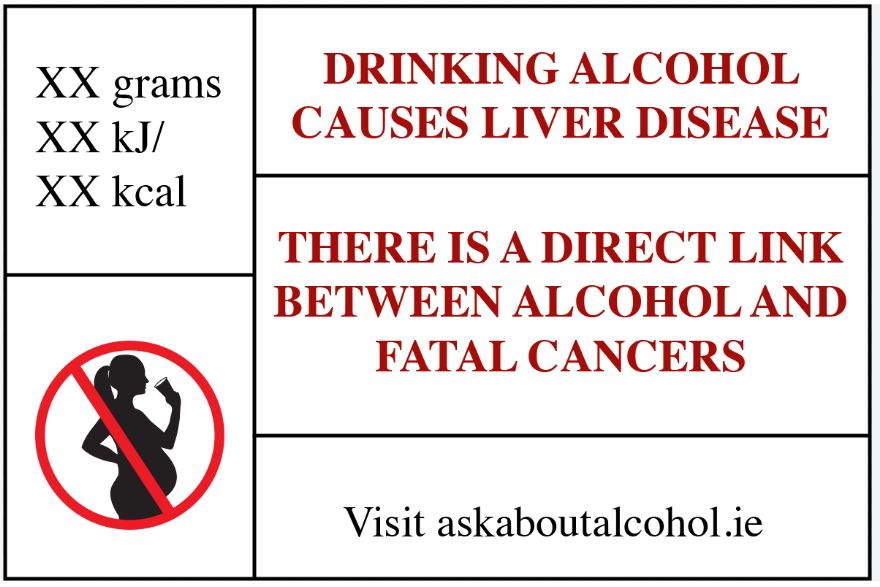WHO report urges EU to adopt alcohol warning labels
As Ireland prepares for new alcohol labelling next year, HRB Research Officer Anne Doyle reports on calls for other EU countries to follow suit.
4 min read - 19 Feb 2025

The European Commission is being urged to adopt alcohol warning labels similar to those due to come into force next year in Ireland. The World Health Organization (WHO) has this month reinforced its position that alcohol health warnings are crucial for informing consumers about the risks associated with drinking, particularly its direct link to cancer. As Ireland leads the way with new labelling regulations, experts and policymakers across the EU are calling for similar measures as those approved by the Department of Health.
The case for alcohol labelling
Despite the well-documented link between alcohol and cancer, public awareness remains low. A WHO report published this month highlights that research involving nearly 20,000 participants from 14 European countries showed clear cancer warnings on alcohol labels significantly increased awareness and encouraged discussions around alcohol-related harm.
“Clear and prominent health warning labels on alcohol, which include a specific cancer warning, are a cornerstone of the right to health because they empower individuals with vital information to make informed choices about the harm alcoholic products can cause,” according to Dr Hans Henri P Kluge, WHO Regional Director for Europe.
Similarly, Dr Gauden Galea, Strategic Adviser to the WHO Regional Director, emphasised that health warnings raise awareness, reduce alcohol’s appeal, and influence drinking norms, especially among younger generations.
Ireland’s ground-breaking legislation
Ireland is set to become the first country in the world to introduce comprehensive alcohol labelling under Section 12 of the Public Health (Alcohol) Act 2018. This legislation requires all alcohol products to display labels informing consumers about:
- The dangers of alcohol use.
- The risks of alcohol consumption during pregnancy.
- The direct link between alcohol and cancer.
- The alcohol content (in grams) per container.
- The calorie content per container.
- A website providing independent public health information.

Similar health information must also be available in licensed premises. Although the law will not come into force until May 2026, it sets a strong precedent for public health-focused alcohol regulation globally.
Role of the HRB in alcohol policy
The Health Research Board (HRB) has played a key role in shaping Ireland’s alcohol policy. HRB alcohol overviews have consistently highlighted alcohol’s public health impact and served to inform the 2012 Steering Group Report on a National Substance Misuse Strategy, which in turn formed the basis for the Public Health (Alcohol) Act. These reports have influenced media discourse and policy decisions, reinforcing the necessity of clear alcohol warnings.
Despite resistance from industry lobbyists, the HRB’s evidence-based findings have helped secure support for labelling laws from public health advocates and international organisations like the WHO.
Support for EU-wide alcohol labelling
The Centre for European Policy Network (CEP) has called for EU-wide mandatory alcohol warnings, explicitly supporting the adoption of Ireland’s regulations throughout the EU: “To prevent fragmentation, the EU must introduce a legislative proposal extending the Irish regulations to the entire internal market,” the 2023 report said.
Prof Andrea De Petris, from the University of International Studies in Rome, who co-authored the report reiterated this in The Lancet, this month. “There is a new European Commission, so we will see what happens, but we suggest embracing the Irish initiative to prevent fragmentation of the internal market,” he said.
WHO endorsement and the path forward
WHO policy documents, including the Global Alcohol Action Plan 2022–2030 and the European Framework for Action on Alcohol 2022–2025, highlight alcohol labelling as a priority in reducing alcohol-related harm. The organisation firmly supports mandatory, evidence-based labels, arguing that self-regulation by alcohol producers is insufficient. Without legal enforcement, producers may use vague messaging or inconspicuous label placement, reducing the impact of health warnings.
WHO research suggests cancer-specific warnings are the most effective in raising awareness. Findings indicate strong public support for mandatory labelling, with over three-quarters of respondents in favour of clear health warnings on alcohol packaging.
Conclusion
With mounting evidence of alcohol’s public health risks and increasing support for mandatory labelling, Ireland’s approach is backed by a robust evidence framework that other countries can follow. EU-wide regulations would align alcohol warnings with those found on other food and beverage products and ensure consumers are informed about alcohol-related risks.
4 min read - 19 Feb 2025



